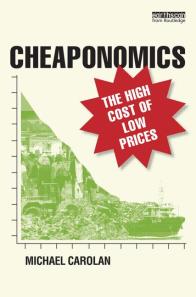.
 Carolan unmasks what he frequently refers to as socialism of the costs, whereby the costs of production are socialized while the profits are privatized.
Carolan unmasks what he frequently refers to as socialism of the costs, whereby the costs of production are socialized while the profits are privatized.I have long been struck by how the term "socialist" has been used, particularly in the United States. As far as I can tell, it refers exclusively to someone who promotes redistributive policies that seek to spread the wealth. Under this scenario, the benefits generated by the an economy are spread - are socialized - to various degrees across society. Yet benefits are not the only things that can be socialized. Costs can too. While quick to brand their intellectual adversaries as socialists, proponents of the economic status quo have yet to catch on to the fact that they are also deserving of the "socialist" title. They strive to make society pay for the costs of this economic system while concentrating the benefits with the hands of the few. They are socialists too, though the type they promote I would argue is far more insidious, unjust, and unsustainable than that advocated by their antagonists. This brings me to the book's title: Cheaponomics - shorthand for cost-socializing socialism. (p.3)
Carolan through successive chapters paints a clear picture of how the cheapness of food, free plastic bags, automobiles and the overall trends towards retail concentration, low prices, long hours have huge costs for society and the environment that we all pay. While not optimistic, he does close with ten recommendations for the good, affordable and affording. Like all good economists he highlights among many things the need for increasing transparency and and enhancing our democracy.
These are basic elements that all societies can benefit from that have positive ripple effects across the economy, the social fabric, and the environment. It highlights the hypocrisy of those who decry attempts to get labels of origin on their food and other products or whether or not the ingredients are organic, or GMO free, or the chemicals used in fracking, or whether they come from the other side of the planet produced by slave labor. For markets to function well at all, there must be full information for the consumer to make intelligent choices (a principle for which Joseph Stiglitz was rewarded with a Nobel award).
I would extend transparency to include how profits are used or shared with stakeholders, which would let us know if firm X was compensating its employees well or poorly; giving to the community for public purposes; or lobbying for their private benefit. Until we take the full range of social and environmental costs into account, the market will continue to redistribute wealth to private gain with little concern for the public good. Call it what you will, but the data Carolan shares shows us the costs are real and are mounting.
We can quibble with his recommendations, but we do need to confront the reality he lays bare before us.

I agree that transparency in how profits are used is essential.
ReplyDelete